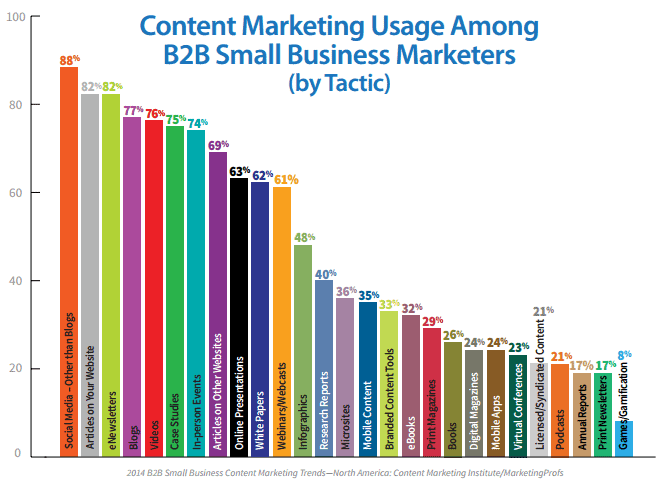 While trying to find some topics on content marketing on Quora, I came across this old question: Does content marketing work?
While trying to find some topics on content marketing on Quora, I came across this old question: Does content marketing work?
This is an old question and it was posted back in 2015 by Neil Patel, but still, almost daily I come across this question on various content marketing forums and blogs.
Publishing content and distributing it is an age-old form of content marketing. In his book Epic Content, Joe Pulizzi refers to The Furrow magazine that was published and distributed back in 1895. Here is the full story of how the company that sold John Deere’s new revolutionary steel plow used content marketing to sell the new equipment.
The Furrow‘s first issue was printed in 1895, and its reader base grew drastically in the immediate years that followed. The magazine focused on educating the farmers about the latest advancements in the field and also shared solutions to problems that existed then. Longtime Furrow art director Tom Sizemore associates the success of the magazine with their content strategy that focused on the farmer’s problems rather than on John Deere products.
It is said that the Star Wars movies have made close to $5 billion for its makers and promoters, but the merchandise sold in the name of the movie has done business close to $12 billion. This is one of the biggest examples of the success of content marketing – create a platform and then using that platform, generate business.
Just like any other field, content marketing has its clearly-defined rules. Follow the rules and guidelines and your content marketing is going to succeed. Ignore the rules and guidelines, well, at your own risk.
A few months ago I wrote The never changing fundamentals of content marketing. The fundamentals, the rules, the guidelines, or whatever you call them, keep you on the right path. It’s like, when you are cooking a recipe, there are certain ingredients you cannot avoid. Although you can experiment, the fundamental ingredients have to be the same otherwise you will be cooking something else and not what you originally intended to cook.
Want to make sure that your content marketing is successful? Aside from following fundamental guidelines I have mentioned above, here is a nice post that talks of The 12 simple rules of successful content marketing. In whatever context, in whichever language you talk of these rules, they hardly change. Even their digital existence doesn’t alter their behaviour. These are the rules the above post talks about:
- Create unique content: The importance of unique content cannot be understated. The sole purpose of content marketing is to give you a unique identity. If you are publishing something that is available on every second website or blog, how are you going to stand out? You can stand out only when you publish something unique, something totally different from what the others are publishing. Publish fewer blog posts, web pages and social media updates, but always publish unique content.
- Tailor your content according to the medium: Content marketing will require you to publish content on different media. For example, you may publish blog posts, web pages and articles on your own website. Twitter has its own limitation of 140 characters (although this limit is being raised up to 280 characters). Images and shorter updates do well on Facebook. The point is, in order to be successful in content marketing, publish content according to the medium you are using to publish it.
- Create or write relevant content: Is your content useful to people? I publish a content marketing and content writing blog to share my knowledge of my profession. Suddenly if I start publishing film reviews or recipes, will it do any good to my business? I don’t think so. So, always create or write content that is relevant to your business.
- Follow a content publishing schedule: Even when people don’t consciously realize it, they get used to hearing from you at a particular time or during particular days. Also, to optimize your content marketing effort, you should publish your content when there is the greatest chance of your audience coming across it. Suppose, most of the people who follow you on Facebook come online around 4-5 PM every day. If you don’t publish updates during this time, most of the people are going to miss them. Similarly, if you publish a new blog post every Wednesday, stick to the schedule no matter what. Irregularity makes your brand appear non-serious and non-committed.
- Don’t just focus on your blog: Actually, this depends. If most of your business depends on an audience that prefers to read your blog posts, then definitely you should focus on your blog. But if you want to reach out to a wider audience, you should think beyond your blog when implementing your content marketing strategy. Also, it also helps if you publish your content on other platforms. I routinely try to publish on Medium and Quora.
- Closely observe your metrics: Once you start publishing and distributing content on a regular basis, if you are using a tool like Google Analytics, you will start collecting metrics. Analytics data tells you what kind of traffic your content is attracting from search engines and social networking websites. Closely observe your metrics and make changes to your content marketing accordingly. If you are publishing and distributing wrong content (content that doesn’t bring you customers and clients) you will be wasting effort and money.
- Optimize your content for mobile consumption: Your website or blog might be getting a big chunk of traffic from mobile phones. Publish your content in such a manner that it is easily readable from mobile devices. Although whether your content is accessible on mobile devices depends a lot on the structural layout of the website or the blog, there are many ways you can write content that is easier to consume on mobile devices. You may like to read How to do content writing for the mobile-first experience.
- Take creative risks sometimes: To stand out, sometimes you need to write something totally contrary to what you normally write and there is nothing wrong in that. You don’t need to do it often, but sometimes you can take creative risks. For example, what are your views on the various Donald Trump policies and how can you incorporate your views in the basic messaging of your business? How can I connect content marketing and Donald Trump? How can I write on controversial issues without offending my core audience?
- Keep it simple: This is especially important if you are writing for business or B2B. Your messaging needs to be to the point and simple. By simple I don’t mean that you publish content only for dumb and dumber. An average entrepreneur doesn’t have enough time to figure out exactly what you are trying to say. Keep everything straight forward.
- Stick to your brand message: Vagueness confuses people. The above link gives the example of Nike’s “Just do it!” – their every campaign revolves around this message. Define your core message and then stick to it. For example, if I want to establish my brand for “quality content” then every piece of content that I publish should reflect that philosophy. On the other hand, if I want to establish my brand for “cheap content” then every message should convey to my audience that cheap content is available here.
- Respond to feedback as fast as you can: When you publish content, when you express your views, there is bound to be some feedback. People are going to respond. Whether you publish content on your blog or on Twitter, people are going to respond in all sorts of ways. Some responses will be justified and some will be trollish. As you are known for the content you publish, you are also known for the way you respond to feedback.
- Create content for your audience: If every piece of content you create and publish is to promote your business, along the way it begins to lose its charm. You desire to earn more and more business takes precedence and this begins to show through your content. Of course you want to grow your business, but let your content do the job.
Just like the proverbial “butterfly effect” there can be millions of factors contributing to success or failure of your content marketing. But, as mentioned above, there are some fundamental rules that are applicable not just to content marketing, but to every field. They can even be applied to your business in the conventional sense.


